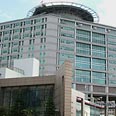
Egypt: Politics outweigh citizens’ health
Father of Egyptian boy suffering from cystic fibrosis slams Ministry of Health in al-Ahram newspaper for inaccessibility to Israeli drug Creon 1000. 'A little boy is suffering every day, and everyone is evading responsibility’
Such is the case of an Egyptian father whose young son suffers from cystic fibrosis. Over the pages of the state-owned Al-Ahram newspaper, he has decided to wage war against the Egyptian Ministry of Health for its refusal to cooperate with Israel to help his ailing son.
In his letter to the newspaper, which was published last Saturday, the boy’s father slammed the Egyptian Ministry of Health for putting politics above welfare.
According to the father, Israel is the only country in the world that produces a drug called Creon 1000 which serves as a substitute for one of the enzymes missing in those suffering from cystic fibrosis.
But even though doctors recommended he obtain the medicine for his son, the father writes, he was turned away by the Health Ministry on the grounds that the drug cannot be imported from Israel as there is no direct cooperation between the two countries.
“When I heard this, it seemed crazy, not only because we actually do cooperate with Israel in different fields but rather because this involves the life of a little boy, who suffers every day, and everyone is evading responsibility,” wrote the father.
He criticized the Egyptian Ministry of Health and the man heading it, and demanded a solution to his son's problem.
“My numerous appeals to the health minister in light of the shortage of this drug go unanswered. The current treatment offered to my son is not helping him and he is suffering from side effects.”
‘How can I save my son?’
The article revealed that the father has managed to obtain the medicine through an alternative channel, but the cost is overwhelming. "I get the medicine in roundabout, tortuous ways and the price is much higher than the original cost,” said the outraged father.“My son needs four packages of this medicine a month, and I am a state employee who makes a monthly salary of a few hundred Egyptian pounds. How can I save my son? Please advise me?”
The Al-Ahram newspaper did not remain indifferent and published its response to the letter: “We don’t know whether or not the drug in question is indeed manufactured solely in Israel, as you noted or if there are other sources. We need to clarify this point with the Ministry of Health.”
However, the paper emphasized, “one thing is for certain and that is that your son and other ailing people have a right to receive medical assistance. We call upon those with the authority to assist in acquiring the drug to enlist for his sake. We are still awaiting an answer from the Ministry of Health,” said the letter.
This is not the only incident proving the aperiodic Egyptian opposition to normalization with Israel. Another problematic situation occurred when the bird flu broke out in Israel.
One of the first birds checked was diagnosed with an Egyptian-originated virus.
The relevant officials in Israel asked to call and update their Egyptian counterparts but no one agreed to pick up the phone and receive the call.
Icy relations
The overall tone in Egypt does not support the normalization of ties with Israel, even regarding issues which can assist the suffering local economy.
This issue was brought to light in gas sales to Israel. The Muslim Brotherhood slammed the Egyptian leadership on this issue and even the Grand Mufti Nasr Farid Wassel expressed his opposition to selling gas to Israel in an interview he gave recently.
Nonetheless, once in a while it is possible to see different Egyptian officials directing their criticism towards the Egyptian government, (not against Egyptian President Hosni Mubarak) wondering aloud why they do not receive assistance from Israel.
The Egyptian journalist Muhammad Attiya inquired about why his country did not receive rescue aid from Israel while Egyptians were trapped during Cairo’s rockslide tragedy.
Attiya published his article last Monday in the Al-Dustur opposition newspaper called.
The icy relations are expressed openly on the official stratum but the picture is different on the nonofficial level.
An Egyptian who has the necessary funds or right connections does not ask for permission from anyone and flies everywhere, including to Israel.
This is not only the case with Egyptians. People from the entire Arab world spend a sizeable chunk of their money on experts found in Israeli hospitals.










